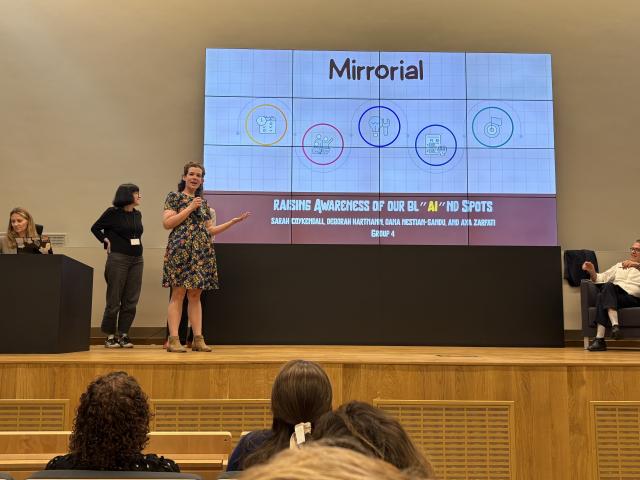Kean’s Sarah Coykendall Joins Global Fellowship Shaping the Future of Holocaust Education

Sarah Coykendall ’18 M.A is helping shape the future of Holocaust education
A Kean educator is part of an international team that is reimagining how the history and lessons of the Holocaust will be taught to future generations.
Sarah Coykendall ’18 M.A., managing assistant director of the Holocaust Education and Resource Center (HERC) and the Human Rights Institute, was selected to participate in the Rethinking Holocaust Education Fellowship, a yearlong, international initiative hosted by the Ghetto Fighters' House Museum and the Auschwitz-Birkenau State Museum.
“Sarah’s selection for this fellowship is a testament to her expertise and reflects Kean’s commitment to ensuring Holocaust education remains relevant and impactful,” said Felice K. Vazquez, Esq., chancellor for international campuses. “She is a vital voice in this global conversation.”
Launched in 2025, the fellowship brings together approximately 30 Holocaust scholars from around the world.
“The reality is that within our lifetime, we’ll live in a world without Holocaust survivors,” Coykendall said. “It’s not if Holocaust education will continue, but how it will continue. We were selected among Holocaust scholars and educators from around the world to help shape what that future will look like.”
As part of the fellowship, the cohort traveled to the Auschwitz-Birkenau State Museum in Oświęcim, Poland, for intensive work sessions focused on the future of Holocaust education. Over the next academic year, participants will continue collaborating remotely before presenting their findings in Israel in September 2026.
Coykendall said the experience affirmed Kean’s growing international reputation in Holocaust education.
“This experience made me realize that Kean and our Holocaust Education and Resource Center are truly operating on a global scale,” Coykendall continued. “In the last seven years, we’ve grown from a regional entity into a national cornerstone and now an international resource that people turn to for support and guidance on teaching the Holocaust.”
Coykendall’s subgroup is focused on how Holocaust education can address contemporary antisemitism, an effort that builds on HERC’s impact in local communities. After a local New Jersey school district discovered antisemitic graffiti, her team was called upon to deliver a presentation on prejudice and bias that reached more than 2,000 students.
“That experience helped us realize it was time to take the next step in our work,” she said. “While we often discuss historical antisemitism and the Holocaust, addressing contemporary antisemitism allows us to confront all forms of prejudice and bias.”
Coykendall, who earned her M.A. in Holocaust and Genocide Studies at Kean after completing her undergraduate degrees in history and anthropology, continues to mentor students pursuing the same passion. Additionally, she leads the HERC’s education consortium, consisting of over 150 school districts to provide presentations statewide.
Her work is part of the broader mission of the HERC and Human Rights Institute, led by Executive Director Adara Goldberg, Ph.D., which engages more than 20,000 students, teachers and community members annually.
The Center also offers a Post-Baccalaureate Certificate in Teaching the Holocaust and Prejudice Reduction and a dual-credit course, Holocaust, Genocide, and Modern Humanity, along with educational initiatives, conferences, commemorations and a robust collection supporting teaching and research.
Coykendall’s leadership in the classroom and community stems from a deeply personal commitment to Holocaust remembrance. Her dedication to the field began in high school, when she first read Elie Wiesel’s memoir Night, which recounts his experiences in Nazi concentration camps during World War II.
“Nothing changed my perception of humanity more than Night,” she said. “It showed me both the capacity of humans and how we treat one another. It also revealed that even after unimaginable horror, people can endure, persevere and rebuild, and that’s what drew me to study the Holocaust.”